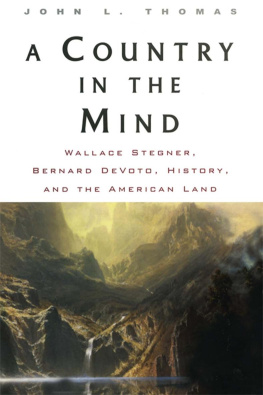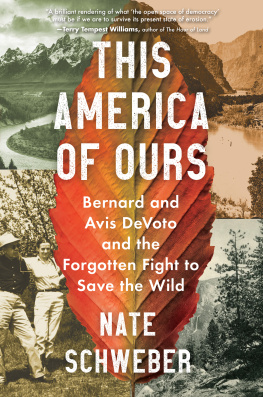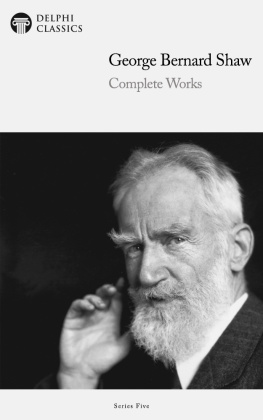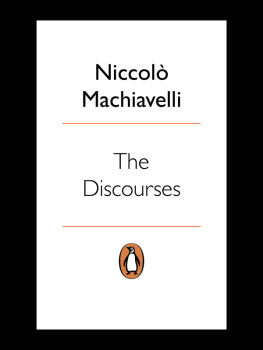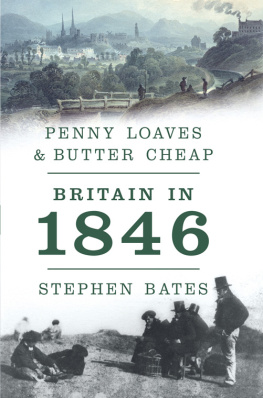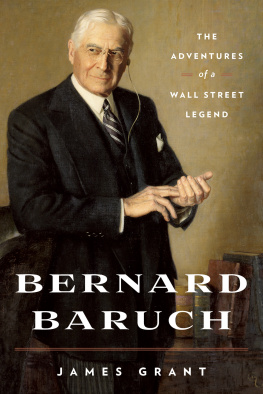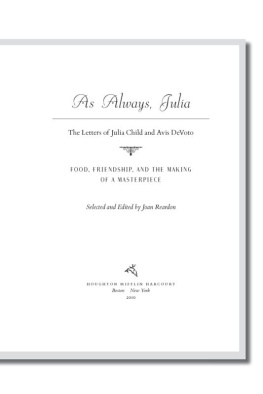Bernard DeVoto - The Year of Decision 1846
Here you can read online Bernard DeVoto - The Year of Decision 1846 full text of the book (entire story) in english for free. Download pdf and epub, get meaning, cover and reviews about this ebook. year: 2000, publisher: St. Martins Press, genre: Politics. Description of the work, (preface) as well as reviews are available. Best literature library LitArk.com created for fans of good reading and offers a wide selection of genres:
Romance novel
Science fiction
Adventure
Detective
Science
History
Home and family
Prose
Art
Politics
Computer
Non-fiction
Religion
Business
Children
Humor
Choose a favorite category and find really read worthwhile books. Enjoy immersion in the world of imagination, feel the emotions of the characters or learn something new for yourself, make an fascinating discovery.

- Book:The Year of Decision 1846
- Author:
- Publisher:St. Martins Press
- Genre:
- Year:2000
- Rating:5 / 5
- Favourites:Add to favourites
- Your mark:
- 100
- 1
- 2
- 3
- 4
- 5
The Year of Decision 1846: summary, description and annotation
We offer to read an annotation, description, summary or preface (depends on what the author of the book "The Year of Decision 1846" wrote himself). If you haven't found the necessary information about the book — write in the comments, we will try to find it.
The Year of Decision 1846 — read online for free the complete book (whole text) full work
Below is the text of the book, divided by pages. System saving the place of the last page read, allows you to conveniently read the book "The Year of Decision 1846" online for free, without having to search again every time where you left off. Put a bookmark, and you can go to the page where you finished reading at any time.
Font size:
Interval:
Bookmark:
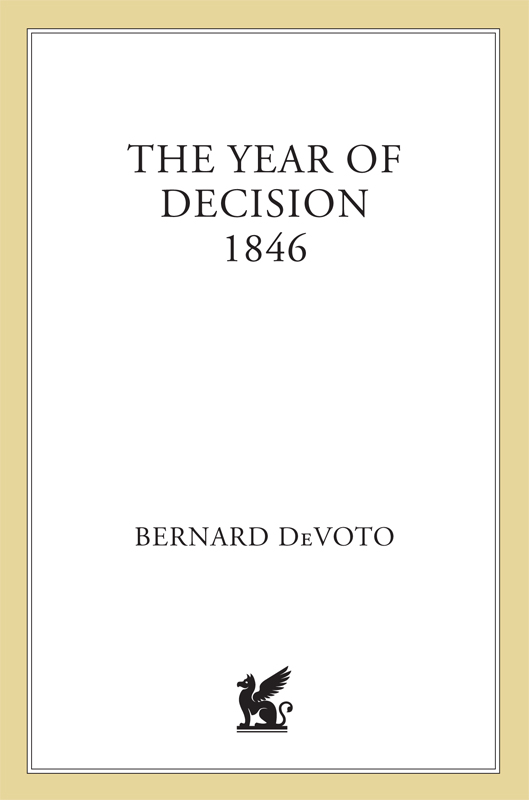

The author and publisher have provided this e-book to you for your personal use only. You may not make this e-book publicly available in any way. Copyright infringement is against the law. If you believe the copy of this e-book you are reading infringes on the authors copyright, please notify the publisher at: us.macmillanusa.com/piracy.
Contents
DEDICATION
Dear Kate:
While I was writing this book you sometimes asked me what it was about. Reading it now, you will see that, though it is about a good many things, one theme that recurs is the basic courage and honor in the face of adversity which we call gallantry. It is always good to remember human gallantry, and it is especially good in times like the present. So I want to dedicate a book about the American past written in a time of national danger to a very gallant woman,
TO
KATHARINE GRANT STERNE
Yours,
Benny
Acknowledgments
THE writing of history is a co-operative enterprise. Many people have helped me write this book by providing information, by directing me to the sources of information, by answering my questions, by discussing matters with me, by clearing up ambiguities, by finding ways through difficulties that had delayed me. It is impossible for me to thank them individually or even to make a full list of them. I want, however, to express my obligation to a number of them whose help has gone beyond the ordinary courtesy of the republic of letters.
Five people in particular have given me extraordinary aid. Therefore, first of all, my thanks to:
Charles L. Camp and Dale L. Morgan, specialists, who have patiently answered innumerable questions, put their knowledge at my disposal, empowered me to publish results of their work, and made special searches for me that encroached upon their leisure time and proper interests.
Madeline Reeder, who found a way for me through a barrier that had stopped me cold and read my manuscript with critical attention to detail.
Rosamond Chapman, who began working with me on the material of this book in 1935, and has ever since been the custodian of my accuracies and my handy guide to research in the West.
Arthur M. Schlesinger, Jr., who toured the West with me in the summer of 1940 and argued out most of the book with me before it was written, who has put his own researches at my disposal, has shaped or modified many of my ideas, has critically read my manuscript, and has saved me from making a good many errors I should certainly have made except for him.
If a number of my friends who are professional historians read the book I have so insistently talked over with them, they will probably experience something halfway between shock and horror. I formally absolve them from all responsibility for anything printed in it but must insist that, by boring them for many years with talk about the West, I have formed my own ideas through friction with theirs. To Paul Buck, Arthur M. Schlesinger, Sr., Frederick Merk, Perry Miller, and Kenneth Murdock: thanks, this is in part your book, and you will see in it a part I was to build of a structure we planned together as a common job, a long time ago when I was a colleague of yours.
My thanks for help freely given to: Garrett Mattingly, Donald Born, Samuel E. Morison, Randolph G. Adams, Lewis Gannett, Franklin J. Meine, Mary Brazier, Wallace Stegner, Eleanor Chilton, Elaine Breed, Henry Canby, Edward Eberstadt, Charles P. Everitt, Mason Wade, George Stewart, Elmer Davis, Dr. Henry R. Viets, Dr. George R. Minot, Dr. William G. Barrett, Dr. Lawrence S. Kubie, Dr. Robert S. Schwab, George Stout; to the officers and employes of the Harvard College Library, the New York Public Library, the Library of Congress, the Missouri Historical Society, the Bancroft Library, and the State Library of Illinois; also to many local librarians in the West and to many Westerners whose names I do not even know, who made a summer tour fruitful in the study of history.
Quotations from James Clyman: American Frontiersman are by permission of Charles L. Camp and the California Historical Society.
Quotations from the unpublished notebooks of Francis Parkman are by the courtesy of Mason Wade and the permission of the Massachusetts Historical Society.
Finally, I acknowledge that I could not possibly have written the book if I had not had periodic assistance from Mr. John August.
B. DV.
Preface
THE purpose of this book as stated in the opening pages is a literary purpose: to realize the pre-Civil War, Far Western frontier as personal experience. It is, however, considerably longer than it would have been if fulfilling that purpose had not proved to involve a second job. I found that my friends and betters, the professional historians, had let me down. One who wanted to study the Far West at the moment when it became nationally important and to study it in its matrix could turn to no book that would help him very much. His only recourse was Paxsons encyclopedic treatment of the whole frontier from 1763 to 1893. Since Turners great beginning the frontier has been a favorite subject of the profession and yet there is no unified study of the area in which this book is set in relation to its era. There are a great many specialized studies and a vast accumulation of monograph material both of which, however, have left wholly untouched a number of matters treated herein which I have had to settle for myself. But there is no synthesis of them. The profession, in short, has broken up this phase of our history into parts; it has carefully studied most but by no means all of the parts; it has not tried to fit the parts together. And the stories I wanted to tell could not be told intelligently unless their national orientation was made clear. So perforce I have had to add to my primary job another job which it was reasonable to expect the historians would have done for me.
My hope is that, in combining the two jobs, I have not bungled both. I write for the nonexistent person called the general reader. He is here promised that, once it gets under way, my text does not long depart from actual events in the lives of actual men and women. In getting it under way I have chosen the stern but kinder way of throwing at him a first chapter of grievous weight. If he survives that, he will find things happening from then on.
By the end of the first chapter, also, the method of the book will be clear. The actual narrative is always rigorously chronological, and the parts of the book are kept as close to a chronological order as the multiplicity of stories will permit. In passages designed to illustrate or interpret the narrative, however, I range forward and backward in time as far as the end in view requires. Thus the narrative of my first chapter covers the month of January, 1846, but some of the quotations from Walt Whitman belong to 1847 and some of those from Thoreau date back to 1843 and forward to 1849. Similarly, I not only allude to the Presidential campaign of 1844 but follow some of its issues back to La Salle and on to 1942. Usually such departures from chronology are immediately self-apparent; where they are not, I have called attention to them.
Acknowledgments and a statement about bibliography are made separately.
B ERNARD D E V OTO
C AMBRIDGE , M ASSACHUSETTS
February 12, 1942
New Preface to the Year 2000 Edition
BERNARD DeVotos The Year of Decision: 1846, published in 1943, was the first of what eventually became three large-scale books on the discovery and opening of the American West. My father actually wrote them in reverse historical sequence: The third volume, The Course of Empire (1952), begins with Christopher Columbus and continental exploration; Across the Wide Missouri (1947) covers the fur trade of the 1830s; while The Year of Decision brings the complex and manifold historical narrative up to a climax in 1846. Except for brief periods, all three volumes, as well as their companion, DeVotos popular edition of The Journals of Lewis and Clark, have been in print ever since first publication. The present St. Martins Griffin edition of The Year of Decision marks the first appearance in more than a decade of a handsome, inexpensive, and easily portable paperback version.
Font size:
Interval:
Bookmark:
Similar books «The Year of Decision 1846»
Look at similar books to The Year of Decision 1846. We have selected literature similar in name and meaning in the hope of providing readers with more options to find new, interesting, not yet read works.
Discussion, reviews of the book The Year of Decision 1846 and just readers' own opinions. Leave your comments, write what you think about the work, its meaning or the main characters. Specify what exactly you liked and what you didn't like, and why you think so.

